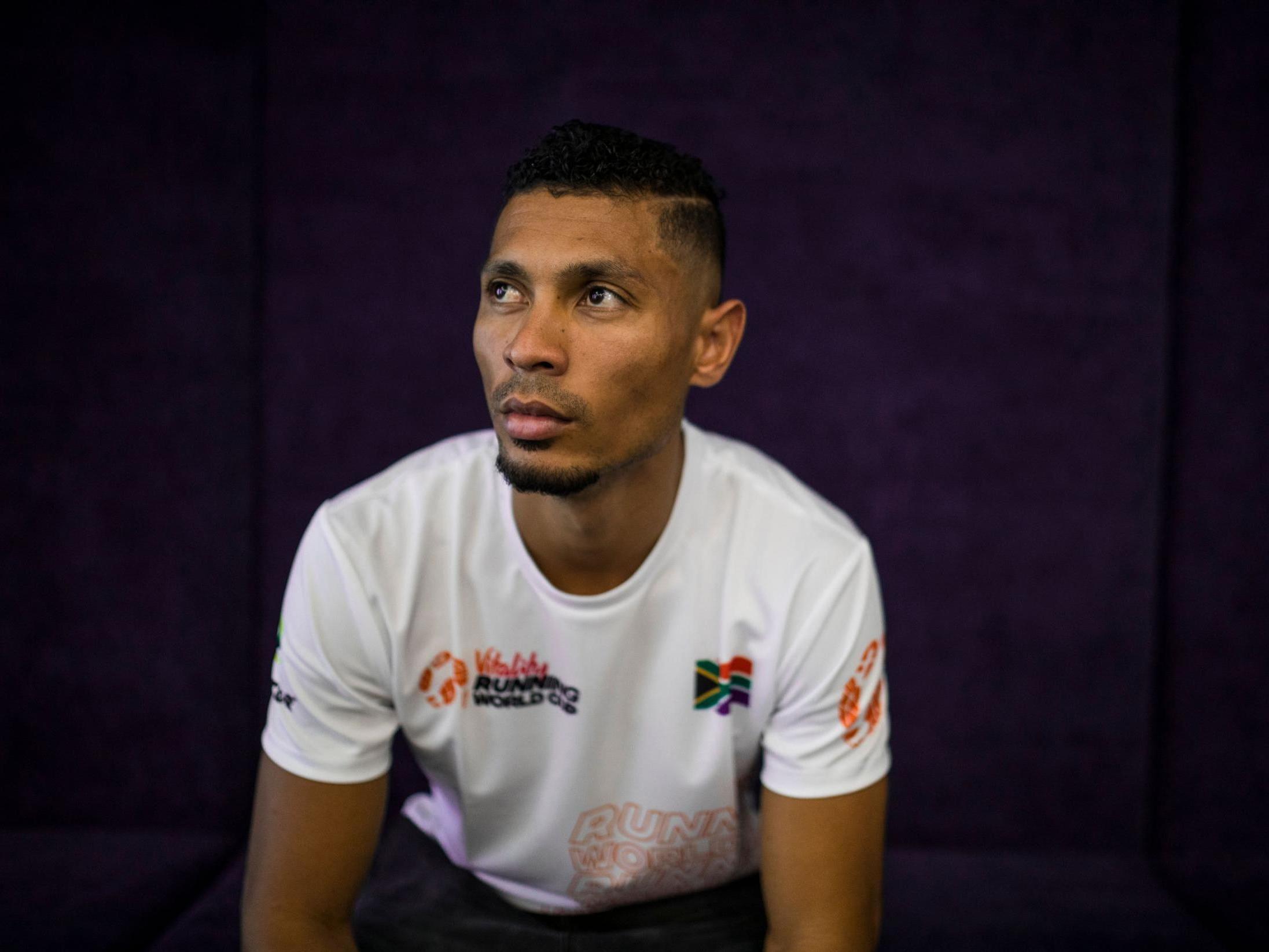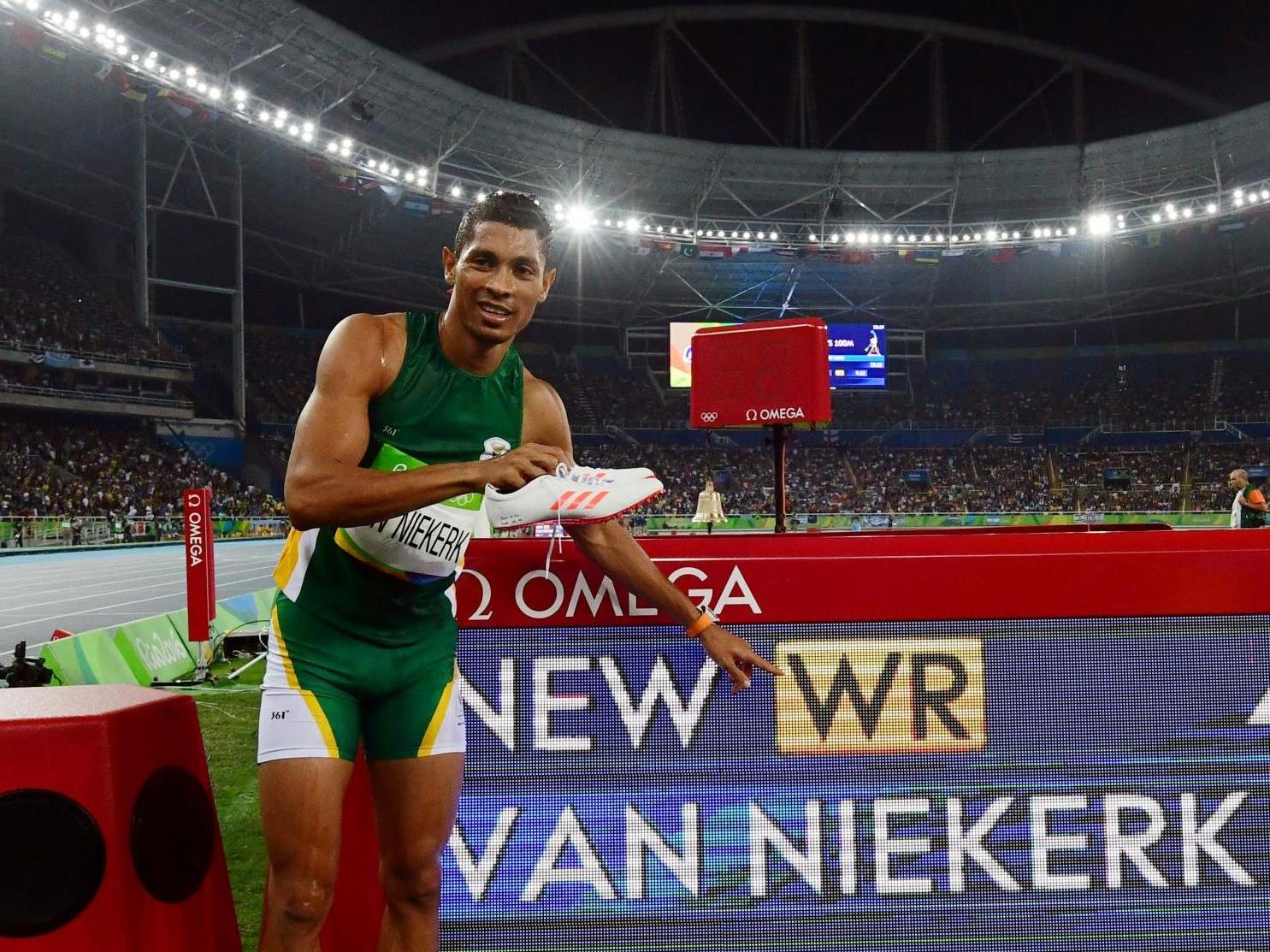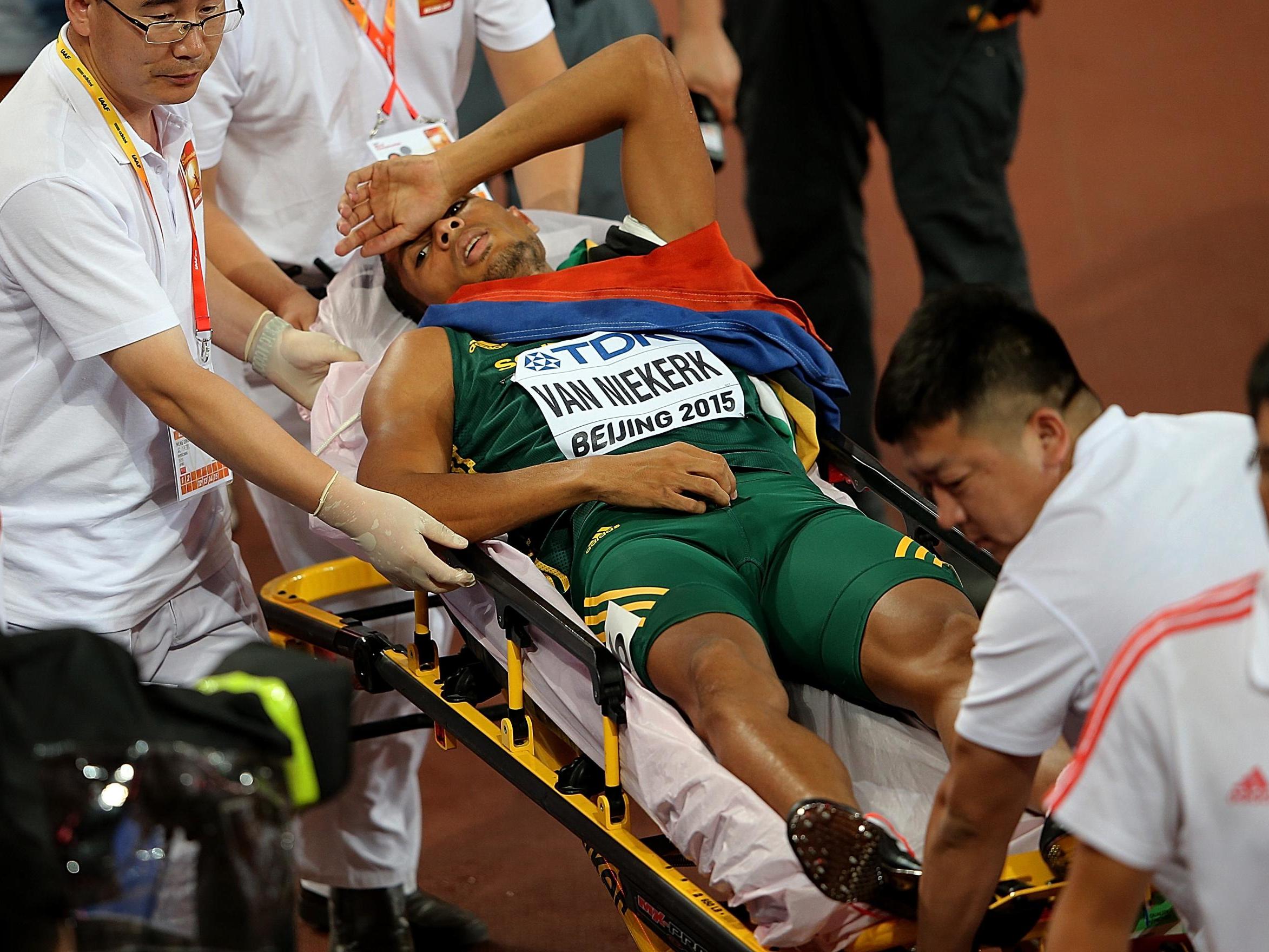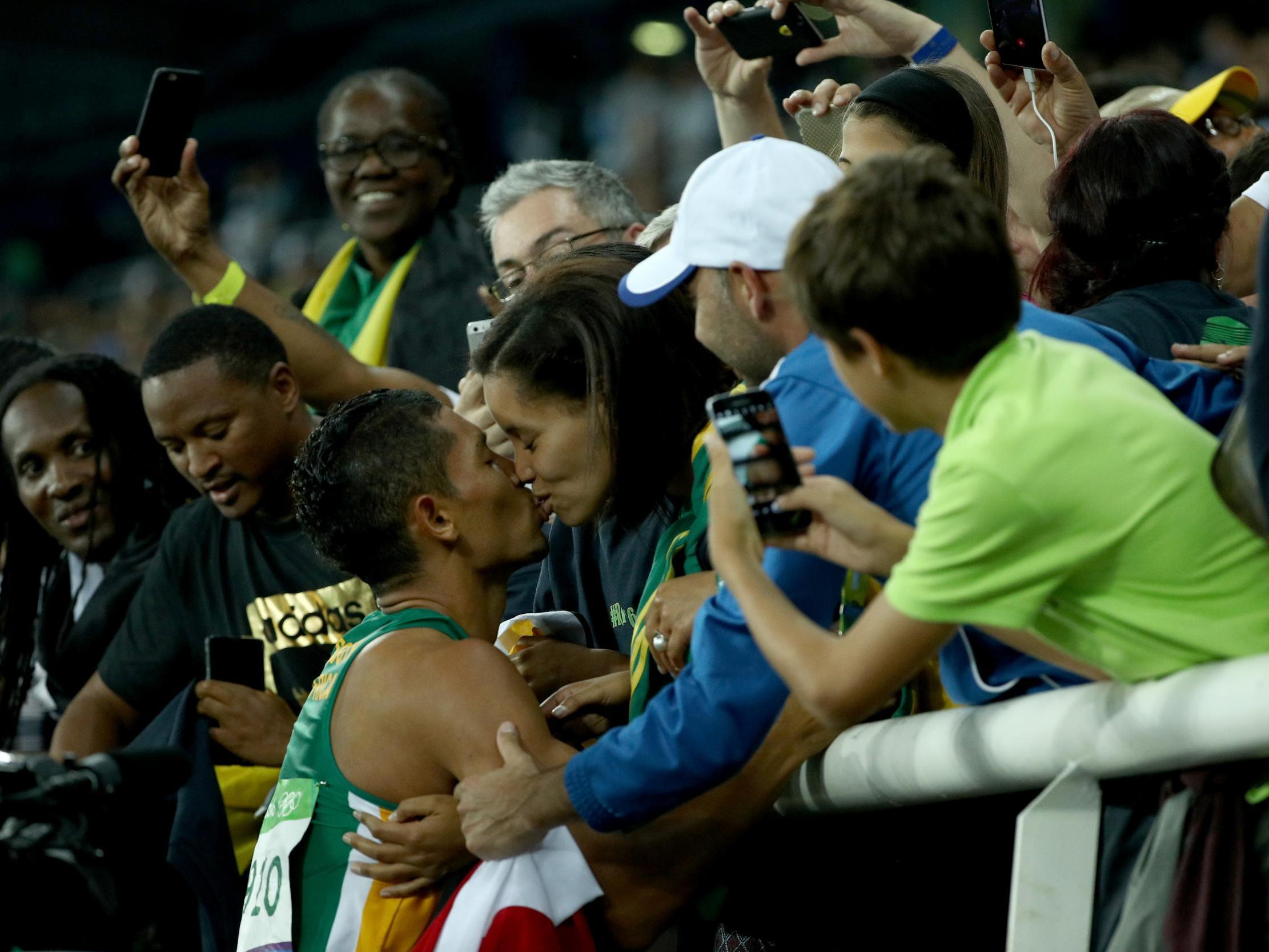‘Our hearts and minds had already drifted away from Tokyo’: Why Wayde van Niekerk is happy to wait
Olympic 400m champion and world-record holder speaks to Melissa Reddy about returning from injury, the Games’ postponement, and how hard upbringings have defined his success and left him forever grateful


“I always think back to before all of this,” Wayde van Niekerk begins, briefly pausing as the snapshots of his childhood play as a rapid mental slideshow. “To before I was a gold medalist and world-record holder, to where I’m from and what I’ve overcome to get here.”
The South African has spent over two years shaking off a knee ligament tear sustained in October 2017, which displaced him from the top of his game, delaying his goals. The injury required surgery, was accompanied by several setbacks and a draining rehabilitation regime with Tokyo 2020 bookmarked as his blockbuster return to the track. The Olympics was the light at the end of an arduous process, but the Games were rightly postponed on Tuesday, until “no later than summer 2021”, due to the coronavirus pandemic.
It would be understandable if Van Niekerk, the current 400 metres world-record holder, was disappointed at how he swung from being king of the sprint kingdom – the man Usain Bolt predicted would “take over track and field” – to have to undergo a restart of sorts and wait another year for his big comeback. Instead, he brims with positivity and gratitude. To comprehend his outlook, you have to revisit how he got off the mark.
The only sprinter in history to have run sub-10, sub-20, sub-31 and sub-44 performances at 100m, 200m, 300m and 400m respectively was given 24 hours to live after being born 11 weeks premature. He needed a blood transfusion, was fighting an infection, had jaundice and was dangerously underweight rendering him not suitable for breastfeeding. Van Niekerk spent the first two weeks of his life in intensive care, where his mother Odessa Swarts – a skilled sprinter herself – was not allowed to make any physical contact with him. Then, being smaller and scrawnier than the other kids, he was bullied through a large swathe of his schooling, where he’d only found “the strength of fight back” through sport.
“Looking at the difficulties and disadvantages I had back then always gives me perspective now,” Van Niekerk says. “It has become an advantage because I already think I’ve been through the worst.

“Yes, going from being a world champion and realising I have the capability to break records to then having a serious injury was difficult to deal with, but I knew I had it in me to emerge stronger after all the other battles I’ve won.
“There were so many goals I had to put on hold, but I knew if I channelled my energy and my thoughts on my aim, on being the athlete I want to be, it would give me something to slowly work towards.”
On more than one occasion, Odessa has emphasised that she believes her son’s greatest achievement isn’t his smashing of Michael Johnson’s 17-year record at Rio 2016 or any of his other golden feats, but his ability to stay grounded.
“His heart is bigger than his talent,” she has said and it therefore comes as no surprise that he struggled to continue training as the severity of Covid-19 was becoming clear across the world.
While other sporting codes ceased and major events like Euro 2020 were postponed, the International Olympic Committee dithered around making a decision until mounting pressure from organisations and athletes.
“Having the last few weeks of training during everything that was going on created stress for me so when it was postponed, it came as a relief,” admits Van Niekerk, who is coached by 77-year-old great-grandmother Ans Botha. “As much as we’re focused and we get into zone to work towards being in top shape for the Olympics, doing that while the world is in the situation we’re in was nerve-racking.
“The announcement was a massive weight off my shoulders. I was in fear because I didn’t want to expose my coach to the virus. It was the constant thought I had and my wife’s sister has a baby as well so it wasn’t easy to go out and train every day knowing I could be exposing them.
“The chances of me recovering from the virus would be likely, but I was in close contact with my coach every day and she’d be at risk of becoming seriously sick. That scared me more than anything, especially as I’m very affectionate and show love and appreciation to those around me. The thought that I could be responsible for anyone becoming infected and seriously ill was frightening.

“For a long while, my mind wasn’t even thinking about the Olympics anymore. I was worried about what’s happening around the world and worried about not making anyone sick. Our hearts and minds had already drifted away from the Games.”
The other issue with the IOC having dragged their feet over delaying Tokyo 2020 was the fact that preparation events for the tournament were being pulled, which placed great mental strain on the competitors.
“The athletes have been under intolerable conditions, many of them are unable to train and many have been going through real emotional turmoil,” World Athletics president Lord Coe pointed out.
It was especially hard on Van Niekerk given his lengthy lay-off and need to do more than most to return to prime conditioning.
“A lot of warm-up events were postponed or cancelled,” the 27-year-old says. “A lot of necessary steps were no longer possible like getting race fit.
“I never had the opportunity to do a proper competitive 400 metre race and to build the sharpness to contest the event at the highest level takes a lot of effort, especially after two years out.
“It was scary for me to wonder whether I’d be physically ready for a big race because I’d suddenly have to compete against the best in the world having had very little preparation.
“I did track meets and local races to feel things out again, but that’s very different from then shifting to an Olympics where you have to be in prime condition.
“My last race was 47.42 seconds [in the 400m Free State provincial championships] in bad conditions and when I take my mark against the world’s best, I have to touch 43. That is a huge gap and to close it, I’d have needed to push my body in a lot more races. That was starting to create doubts and fears in my head because you don’t want to go straight from 47 to 43 because you put yourself at risk of injuries.
“It’s like it is in football pre-season or rehab when you gradually introduce your body to more to reach to the point you need to get to. If you skip the important steps, it doesn’t work. One of the pieces of advice Usain gave me as well while I was recovering from injury was to slowly build back up to my best, not to rush the process. Knowing that there was a chance I’d have to expose myself to the best of the best immediately was definitely a source of stress.”

Van Niekerk, who was given his first pair of running spikes by his step-father Steven Swarts, plans to use the extended period to iron out some issues once it is safe to resume training.
“This gives me more time to sharpen up in the areas I’ve felt has needed work, that I went with the flow in but now I can fine-tune them,” he says. “You never feel perfect, you never feel completely injury-free. I can now address niggles and issues and also allow my body to recover better. It’s not major things – stuff like flexibility and tight muscles – but now I can invest in strengthening them.”
Van Niekerk has been isolating at his home in Bloemfontein with his wife, Chesney, and their dogs Zeus, Kobe and Honey. He is asked if it is a tough concept to be an athlete during a time when it isn’t actually possible to be one.
“I cannot complain,” he says. “The life that I’m living now is so privileged. I have had blessings opportunities and achievements that growing up where I did, people didn’t have and didn’t even think was possible. It’s not me that I’m concerned about.”
Van Niekerk, born in 1992 10 days before the Barcelona Olympics in which South Africa was represented for the first time in 32 years, has a permanent reminder of how fortunate he is to compete on the world stage.
The tournament passed his mum by as she was preoccupied with his survival, but also because the Games never felt like it was for people like her.
Odessa, who was raised in the Cape Town suburb of Athlone, found comfort on the track during the catastrophe of apartheid. Running was also a requisite skill to evade the spray of rubber bullets and teargas – and she was great at it.
At 16, she had equalled the best time set by any girl competing in the 100m under the South African Amateur Athletics Board. Over that distance and the 200m, Odessa began racking up junior records but there were no Olympic dreams – she wasn’t allowed to train at the proper tracks used by white athletes, let alone ever think about representing the country.
Van Niekerk does not just run for himself. He does so for his mum and everyone else past and present that has been prevented from fulfilling their potential due to circumstances.
At his parents house, there is a centrepiece that takes pride of place which showcases the achievements of Odessa and his step-dad as well as those of his siblings Craig and Kayla.
Next to Van Niekerk’s Olympic gold medal, is that first pair of running spikes – blue and red Asics – and the shirt he wore as a nine-year-old achieving Western Province Under-10 colours.
“Thinking back to those days and now is like worlds apart,” he says. “Every little thing in-between and in future that’s good or bad is for a reason and is part of my story, which I’m honoured to have.”
Join our commenting forum
Join thought-provoking conversations, follow other Independent readers and see their replies
Comments
Bookmark popover
Removed from bookmarks